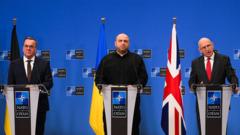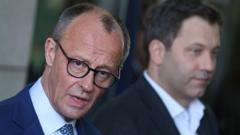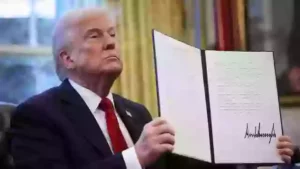The swift coalition deal marks a significant shift in German leadership amid rising global tensions.
Coalition Agreement Paves the Way for Friedrich Merz as Germany's New Chancellor

Coalition Agreement Paves the Way for Friedrich Merz as Germany's New Chancellor
Centrist parties in Germany form coalition allowing Merz to lead at a critical juncture.
Germany's centrist political parties have made headlines with their formal coalition agreement, enabling Friedrich Merz, the leader of the Christian Democrats, to ascend as Chancellor during an increasingly tumultuous period for both Europe and the international community. After securing the majority in the February elections, Merz faced mounting pressure to swiftly establish a functioning government amid essential global developments, including strained relations with the Trump administration and growing uncertainties surrounding NATO and Russia.
In a remarkable move indicative of the urgency of the situation, Merz utilized the interim period to advocate for measures in Parliament designed to expand Germany's debt limits, allowing for substantial increases in infrastructure and military spending. The coalition's formation was notably the quickest since 2009, when Angela Merkel marked her second term in office.
Despite this progress, Germany's stature as Europe's largest economy has been challenged, leaving the nation leaderless amid simultaneous international crises. "We do not yet know the trajectory of global developments, but this is why our message today stands firm: We aim to shape Germany's future amidst these changes," Merz expressed during the coalition's announcement.
The prominent far-right party, Alternative for Germany, which finished in second place during the recent elections, has continued to gain traction in public opinion polls. However, the traditional parties have collectively decided against forming alliances with them due to concerns regarding threats posed to German democracy.
In a remarkable move indicative of the urgency of the situation, Merz utilized the interim period to advocate for measures in Parliament designed to expand Germany's debt limits, allowing for substantial increases in infrastructure and military spending. The coalition's formation was notably the quickest since 2009, when Angela Merkel marked her second term in office.
Despite this progress, Germany's stature as Europe's largest economy has been challenged, leaving the nation leaderless amid simultaneous international crises. "We do not yet know the trajectory of global developments, but this is why our message today stands firm: We aim to shape Germany's future amidst these changes," Merz expressed during the coalition's announcement.
The prominent far-right party, Alternative for Germany, which finished in second place during the recent elections, has continued to gain traction in public opinion polls. However, the traditional parties have collectively decided against forming alliances with them due to concerns regarding threats posed to German democracy.






















